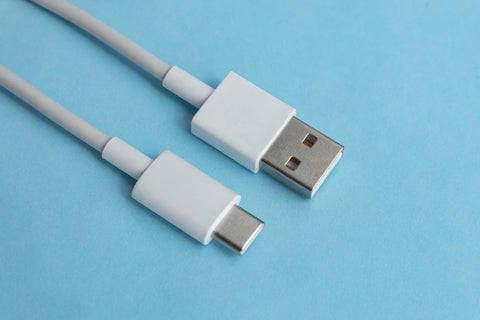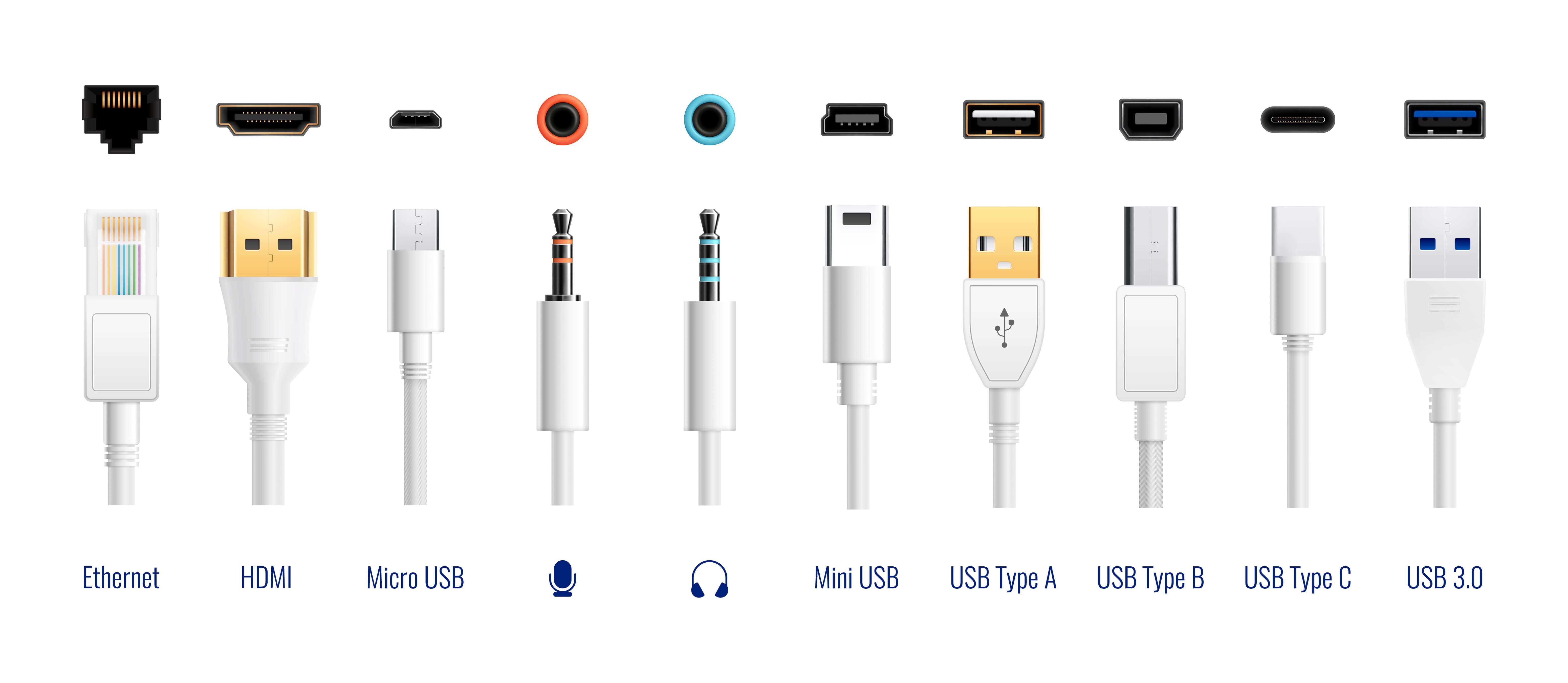Many wonder : Are All USB C Cables the Same Speed? What actually determines the speed of these cables? In this article we will learn about the speed of USB C Cables and the underlying factors behind.
USB-C cables have become increasingly popular in recent years due to their versatility and convenience. These cables were first introduced in 2014 by the USB Implementers Forum (USB-IF), a non-profit organization that develops and promotes USB technology. The USB-C cable is a significant improvement over its predecessors, offering faster data transfer speeds, higher power delivery capabilities, and a reversible connector.
One of the main advantages of USB-C cables is their ability to support multiple protocols, including USB 3.1, Thunderbolt 3, DisplayPort, and HDM

This means that with just one cable, you can connect various devices such as smartphones, laptops, monitors, and external storage devices. The reversible connector also eliminates the frustration of trying to plug in the cable correctly since it can be inserted either way.
Understanding USB-C Cable Speeds
USB-C cables come in different types with varying speed capabilities. The most common types are Gen 1 (USB 3.0) and Gen 2 (USB 3.1). Gen 1 cables offer data transfer speeds of up to 5 Gbps while Gen 2 cables provide speeds of up to 10 Gbps.
Apart from these two types, there are also Thunderbolt™️ certified cables that support even higher data transfer rates of up to 40 Gbps when used with compatible devices.
Key Takeaways
- Not all USB-C cables are the same speed
- USB-C cable speeds are determined by factors such as wire gauge and chipset
- Choosing the right USB-C cable is important for both charging and data transfer
- Using the wrong USB-C cable can damage your device or result in slower charging and data transfer speeds
- Identifying USB-C cable speeds can be done by checking the cable's specifications or using a USB-C tester
Explore a wide range of essential accessories and gadgets at our Repair Mart online store. Whether you're looking for durable cables, reliable adapters, or top-notch screen protectors, we've got everything you need to keep your devices in perfect condition.
At Repair Mart, we offer a diverse selection of high-quality products designed to enhance and protect your devices. From everyday essentials like cables and adapters to specialised items like hydrogel screen protectors, you'll find everything you need in one convenient place. Discover the best mobile phone gadgets to complement your devices today!
Are All USB C Cables the Same Speed
No, not all USB-C cables are the same speed. USB-C is a type of connector, but the speed of data transfer and charging capability can vary depending on the specifications of the cable and the devices it's connected to.
USB-C cables can support different versions of the USB standard, such as USB 2.0, USB 3.0, USB 3.1, and USB 4. The version of USB determines the maximum data transfer speed the cable can handle. Additionally, the quality of the cable and its construction can also affect its performance.
For example, a USB 2.0 cable will have slower data transfer speeds compared to a USB 3.1 or USB 4 cable. Similarly, a cable designed for charging may have different capabilities for power delivery, with some cables supporting fast charging standards like USB Power Delivery (USB PD).
It's important to check the specifications of the cable and ensure compatibility with your devices if you want to maximize data transfer speeds or take advantage of fast charging capabilities.
What Determines USB-C Cable Speeds?
| Factors | Description |
|---|---|
| USB-C Version | The version of USB-C used in the cable affects its speed. USB 3.1 Gen 2 is faster than USB 3.1 Gen 1. |
| Cable Length | The length of the cable affects its speed. Longer cables have more resistance, which slows down the transfer speed. |
| Wire Gauge | The thickness of the wires in the cable affects its speed. Thicker wires have less resistance, which allows for faster transfer speeds. |
| Connector Quality | The quality of the connectors on the cable affects its speed. Poor quality connectors can cause signal loss and slow down transfer speeds. |
| Device Compatibility | The compatibility of the cable with the device affects its speed. Some devices may not be able to take advantage of the full speed of the cable. |
Several factors determine the speed capabilities of a USB-C cable:
1) Cable Type: As mentioned earlier, different types of USB-C cables offer varying speeds.
2) Cable Construction: The quality and construction materials used in the cable can affect its performance.
3) Device Compatibility: The device you connect your cable to must also support high-speed data transfer or charging for you to experience optimal performance.
4) Interference: External factors such as electromagnetic interference or poor shielding can impact the cable's speed.
USB-C Cable Speeds and Charging
The speed of a USB-C cable can significantly affect charging times. With higher-speed cables, you can charge your devices more quickly, provided that both the cable and the device support fast charging technology.
USB Power Delivery (USB PD) is a protocol that allows for faster charging by delivering higher power levels. USB PD is supported by many USB-C cables and devices, enabling rapid charging for smartphones, tablets, laptops, and other compatible gadgets.
USB-C Cable Speeds and Data Transfer
USB-C cables are not only useful for charging but also for transferring data between devices. The speed of your USB-C cable plays a crucial role in determining how quickly files are transferred from one device to another.
For example, if you're backing up large files or transferring high-resolution videos from your camera to your computer, using a high-speed Gen 2 or Thunderbolt™️ certified cable will ensure faster transfer rates compared to using a slower Gen 1 cable.
The Importance of Choosing the Right USB-C Cable
Choosing the right USB-C cable is essential to ensure optimal performance and compatibility with your devices. Using an inferior quality or incorrect type of cable can result in slower data transfer speeds or even damage to your devices.
When selecting a USB-C cable, consider factors such as its intended use (charging or data transfer), desired speed capabilities (Gen 1 or Gen 2), and compatibility with your specific devices.
The Risks of Using the Wrong USB-C Cable
Using the wrong type of USB-C cable can pose several risks to both your devices and personal safety:
1) Slow Charging: If you use an incompatible or low-quality cable for fast-charging capable devices, it may not deliver enough power resulting in slow charging times.
2) Data Corruption: Inferior quality cables may cause data corruption during file transfers due to poor shielding or inadequate data transfer speeds.
3) Device Damage: Using a cable that cannot handle the power requirements of your device may cause overheating, short circuits, or even damage to the device's charging port.
How to Identify USB-C Cable Speeds
To identify the speed capabilities of a USB-C cable, you can look for specific markings or labels on the cable itself. Most reputable manufacturers will indicate whether it is a Gen 1 or Gen 2 cable.
Additionally, Thunderbolt™️ certified cables will have the Thunderbolt logo displayed on them. These cables are capable of achieving higher data transfer rates and are compatible with Thunderbolt-enabled devices.
USB-C Cable Speeds and Compatibility
The speed capabilities of your USB-C cable can affect its compatibility with different devices. While most modern devices support USB 3.0 and above, older devices may only be compatible with slower Gen 1 cables.
It's important to check your device's specifications to ensure compatibility with higher-speed cables if you want to take full advantage of their capabilities.
USB-C Cable Speeds and Device Performance
USB-C cable speeds can impact overall device performance in various ways:
Faster Data Transfer
High-speed cables allow for quicker file transfers between devices, enhancing productivity.
Reduced Latency
When using high-speed cables for peripherals such as gaming mice or keyboards, you'll experience reduced input lag.
Display Quality
Higher-speed cables enable smoother video playback and better resolution when connecting external monitors or projectors.
USB-C Cable Speeds and Cable Length
The length of a USB-C cable can affect its speed capabilities due to signal degradation over longer distances. As a general rule, shorter cables tend to provide better performance compared to longer ones.
For optimal performance when transferring large files or using high-resolution displays, it is recommended to use shorter high-quality cables that minimize signal loss over distance.
USB-C Cable Speeds and Cable Quality
The quality of a USB-C cable can significantly impact its speed capabilities. High-quality cables are constructed using better materials, have superior shielding against interference, and are designed to handle higher power levels.
Investing in high-quality cables ensures that you get the best performance out of your devices while minimizing the risk of damage or data corruption.
USB-C Cable Speeds and Price
When it comes to USB-C cables, price does not always indicate quality or speed capabilities. While some premium cables may offer superior performance, there are also affordable options available that provide satisfactory results.
It's important to strike a balance between price and quality when choosing a USB-C cable. Consider your specific needs and budget before making a purchase decision.
USB-C cables have revolutionized the way we connect and charge our devices. With their faster data transfer speeds, higher power delivery capabilities, and reversible connectors, they offer significant advantages over other types of cables.
Understanding the different types of USB-C cables and their speed classifications is crucial for selecting the right cable for your needs. Factors such as cable construction, device compatibility, interference, charging times, data transfer rates, device performance optimization should be considered when choosing a USB-C cable.
By identifying the speed capabilities of a USB-C cable through markings or labels on the cable itself and considering factors like length and quality along with price considerations can help ensure optimal performance while protecting your devices from potential risks associated with using incompatible or low-quality cables.
In conclusion, by understanding how USB-C cable speeds work and selecting the right one for your specific requirements will enhance your overall experience with various devices while ensuring efficient charging times and fast data transfers without compromising safety or device integrity.
FAQs
What is USB-C?
USB-C is a type of USB connector that is reversible and can transfer data, power, and video.
What is the difference between USB-C and other USB connectors?
USB-C is reversible, meaning it can be plugged in either way, and it can transfer data, power, and video all in one cable. Other USB connectors, such as USB-A and USB-B, are not reversible and can only transfer data.
Why are not all USB-C cables the same speed?
Not all USB-C cables are the same speed because they can have different capabilities and specifications. Some cables may only support USB 2.0 speeds, while others can support USB 3.1 speeds or even Thunderbolt 3 speeds.
What is the difference between USB 2.0, USB 3.1, and Thunderbolt 3?
USB 2.0 is an older standard that can transfer data at speeds up to 480 Mbps. USB 3.1 is a newer standard that can transfer data at speeds up to 10 Gbps. Thunderbolt 3 is a technology that can transfer data at speeds up to 40 Gbps and also supports video and power delivery.
How can I tell if a USB-C cable is the same speed as my device?
You can check the specifications of your device and the cable to see if they match. Look for the USB standard and speed supported by your device and make sure the cable also supports that standard and speed. You can also look for certification logos, such as the USB-IF logo, which indicate that the cable has been tested and certified to meet certain standards.
Discover all the phone accessories you must have to upgrade the safety and functionality of your device at Repair Mart.


